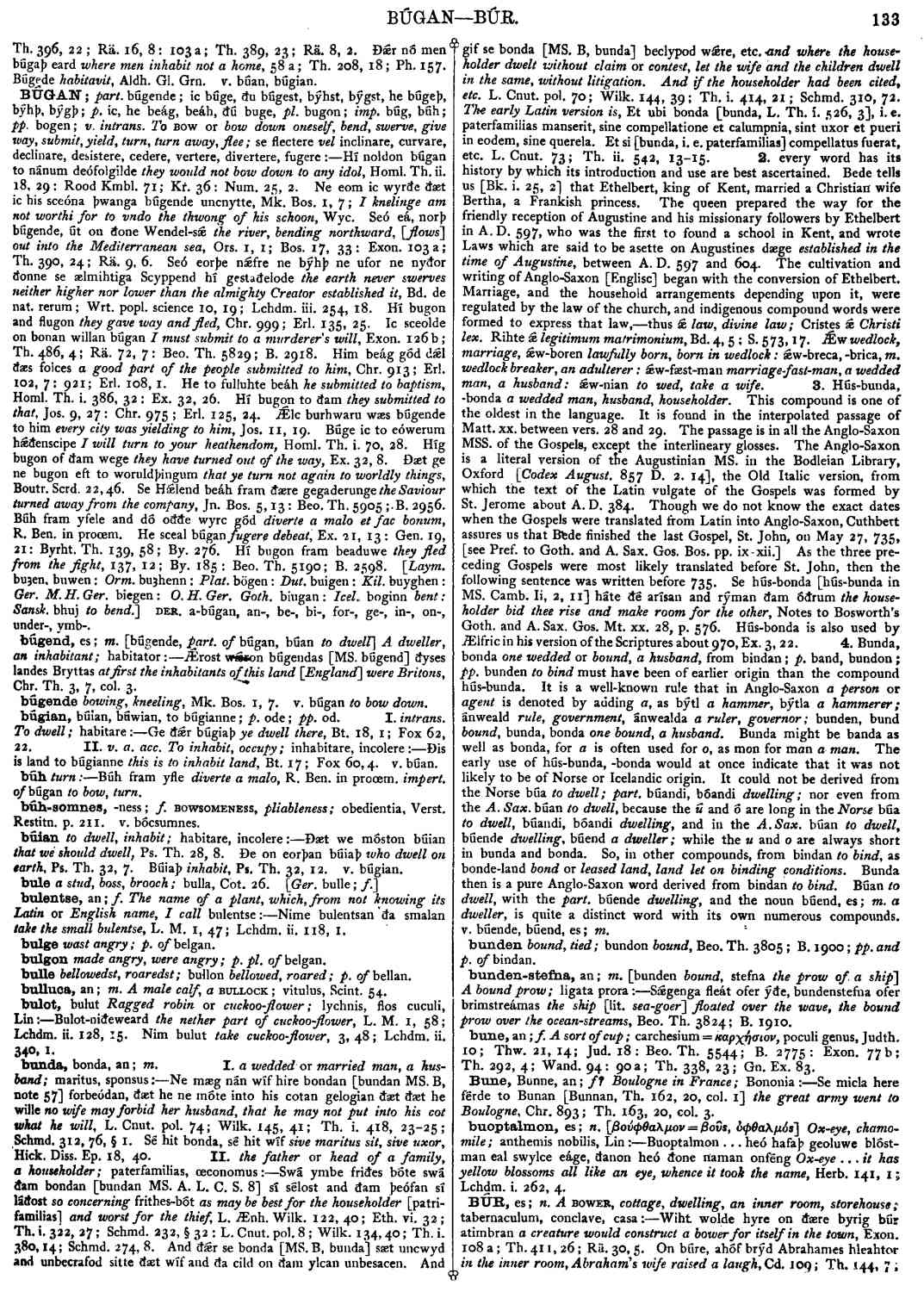BÚGAN
- verb [ strong ]
-
Hí noldon búgan to nánum deófolgilde
they would not bow down to any idol,
- Homl. Th. ii. 18, 29: Rood Kmbl. 71; Kr. 36: Num. 25, 2.
-
Ne eom ic wyrðe ðæt ic his sceóna þwanga búgende uncnytte, Mk. Bos. l, 7; I knelinge am not worthi for to undo the thwong of his schoon, Wyc. Seó eá, norþ búgende, út on ðone Wendel-sǽ
the river, bending northward, [flows] out into the Mediterranean sea,
- Ors. 1, 1; Bos. 17, 33: Exon. 103a; Th. 390, 24; Rá. 9, 6.
-
Seó eorþe nǽfre ne býhþ ne ufor ne nyðor ðonne se ælmihtiga Scyppend hí gestaðelode
the earth never swerves neither higher nor lower than the almighty Creator established it,
- Bd. de nat. rerum; Wrt. popl. science 10, 19; Lchdm. iii. 254,
18.
-
Hí bugon and flugon
they gave way and fled,
- Chr. 999; Erl. 135, 25.
-
Ic sceolde on bonan willan búgan 7
must submit to a murderer's will,
- Exon. 126b; Th. 486, 4; Rä. 72, 7: Beo. Th. 5829; B. 2918.
-
Him beág gód dǽl ðæs folces a
good part of the people submitted to him,
- Chr. 913; Erl. 102, 7: 921; Erl. 108, 1.
-
He to fulluhte beáh
he submitted to baptism,
- Homl. Th. i. 386, 32: Ex. 32, 26.
-
Hí bugon to ðam
they submitted to that,
- Jos. 9, 27: Chr. 975; Erl. 125, 24.
-
Ǽlc burhwaru wæs búgende to him
every city was yielding to him,
- Jos. 11, 19.
-
Búge ic to eówerum hǽðenscipe
I will turn to your heathendom,
- Homl. Th. i. 70, 28.
-
Híg bugon of ðam wege
they have turned out of the way,
- Ex. 32, 8.
-
Ðæt ge ne bugon eft to woruldþingum
that ye turn not again to worldly things,
- Boutr. Scrd. 22, 46.
-
Se Hǽlend beáh fram ðære gegaderunge
the Saviour turned away from the company,
- Jn. Bos. 5, 13: Beo. Th. 5905; B. 2956.
-
Búh fram yfele and dó oððe wyrc gód diverte a malo et fac bonum, R. Ben. in proœm. He sceal búgan
fugere debeat,
- Ex. 21, 13: Gen. 19, 21: Byrht. Th. 139, 58; By. 276.
-
Hí bugon fram beaduwe
they fled from the fight,
- 137, 12; By. 185: Beo. Th. 5190; B. 2598.
Bosworth, Joseph. “BÚGAN.” In An Anglo-Saxon Dictionary Online, edited by Thomas Northcote Toller, Christ Sean, and Ondřej Tichy. Prague: Faculty of Arts, Charles University, 2014. https://bosworthtoller.com/5377.
Checked: 0